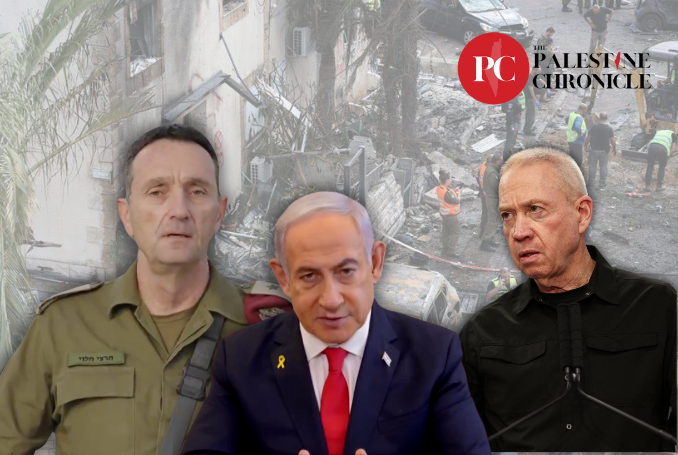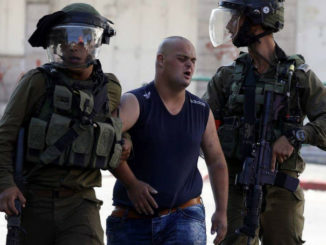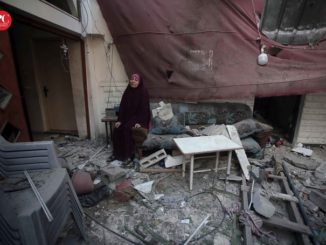
By Palestine Chronicle Editors
Gallant wanted to convey a sense of triumph at a time when the opposite was true. But the Israeli defense minister is not the only one.
“Hezbollah has begun to feel some of the capabilities of the Israel Defense Forces… and we are seeing the results,” Israeli Defense Minister Yoav Gallant said on Sunday.
The defense minister went on to say that “these moves will continue until we reach a situation where we safely return the residents of the north to their homes.”
Though Gallant’s comments were in line with previous such statements, made by him and other Israeli ministers and officials, the context, this time, is different, namely because of unprecedented Hezbollah’s retaliatory attacks in northern Israel, reaching as far as 60 kilometers deep inside the country.
Gallant’s comments were meant to hide Israel’s failure on two fronts: one, failure to eliminate the threat in the first place, and two, failure to prevent Hezbollah from executing its operation, which lasted for hours and reached several military-sensitive areas in the country.
In other words, Gallant wanted to convey a sense of triumph at a time when the opposite was true. But the Israeli defense minister is not the only one.
Prime Minister Benjamin Netanyahu gave an even more confusing message when he threatened that “if Hezbollah didn’t get the message, I promise you, it will get the message”.
That line would have been more appropriate if it was uttered by Hezbollah’s leader Hassan Nasrallah, as after all, the latest message, that of bombing the Ramat David military base and the Rafael industrial-military complex, was a Lebanese, not an Israeli message.
So what message is Netanyahu referring to exactly?
What Message?
On September 17 and 18, the Israeli intelligence executed one of the most brutal operations in its history by blowing up thousands of pagers, walkie-talkies, and other communication devices, resulting in the killing of scores of Lebanese and the wounding of thousands.
Then, on September 20, acting upon precise intelligence information, an Israeli drone blew up a seven-story building in south Beirut, killing top leaders in the Hezbollah Radwan force, in addition to killing and wounding many civilians.
Hezbollah has admitted to the ‘painful blows’ it received, though it was unclear if such chaos would directly affect the performance of the group on the ground.
All of this was followed by what Israel promoted as its most decisive bombing campaign since the start of the war.
The Israeli military said that it has bombed thousands of Hezbollah’s targets, including missile launchers, underground launching sites, and other positions.
Here, a short mathematical detour is important.
Doing the Math
On August 25, when Hezbollah launched its retaliation to the assassination of its top commander, Fouad Shukr, the Israeli military claimed that it had carried out ‘preemptive’ operations that successfully eliminated thousands of Hezbollah’s targets.
Add to this that, almost on a daily basis, Israel speaks of hitting dozens, and sometimes even hundreds of targets.
Therefore, thousands (the ‘preemptive strikes’ of August 25) + thousands (the massive campaign that followed the bombing of south Beirut on September 20) + tens of thousands (the total of the daily strikes since October 8) of such supposedly successful strikes should be enough to eliminate a large standing army.
This is why Hezbollah’s operation, codenamed ‘Open Account’, must have been a complete shock to the Israeli government and military, if they, in fact, believed their own numbers in the first place.
Particularly astonishing is that Hezbollah’s massive and long operation on September 22 relied only on limited types of missiles, improvised Syrian and Iranian rockets named Fadi-1 and Fadi-2, in addition to the use of the standard Katyusha rockets.
Hezbollah’s success has abruptly ended the celebrations in Israel, following the cyber-terror attacks and the killing of the Radwan commanders.
The Magic Act
Scenes of fleeing Israelis to shelters, which must have also included Israeli ministers, Knesset members and officials, did not convey what the words of Netanyahu and Gallant tried to communicate, that Israel is winning, and that Hezbollah is on the retreat.
Israeli officials, however, are hoping that through some kind of a magic act, they would erase everything that took place last night and early morning.
Particularly interesting is the performance of Israel’s Chief of Staff Herzi Halevi, standing in front of an F-15 fighter jet, at Israel’s Tel Hanof military air base. Halevi spoke about how Hezbollah was “shaken up” by the assassination of Ibrahim Aqil, Radwan’s top commander.
Halevi's statement:
"We will return our citizens in the north to their homes, and if Hezbollah does not understand this, we will continue to attack. We are well prepared for the next steps planned for the coming days.
"Hezbollah has been conducting a terrorist war in solidarity… pic.twitter.com/o7L5JDRDvZ
— Intelligence FRONT (@intelligencefnt) September 22, 2024
Halevi went on to detail how remarkable that operation was and how earth-shattering its consequences are expected to be.
Once more, another top Israeli official tries to ignore that between the assassination of Aqil and his press conference, another earth-shattering event had taken place.
“The price that Hezbollah is paying has increased, our attacks will increase,” Halevi said.
This should take us back to our mathematical equation: thousands + thousands + tens of thousands = the imminent destruction of a standing army.
Yet Hezbollah’s response through ‘Open Account’ did not indicate any weakness neither in the political decision, nor in the actual execution of the massive military operation.
Back to Gaza
Another interesting fact is that Israeli officials, including Netanyahu, have returned to speak about Gaza, the elimination of Hamas, and the discussion of turning northern Gaza into a military zone.
What is strange about the return to the Gaza conversation is that the war on Lebanon was meant to be a distraction from the defeat in Gaza in the first place.
Did Israel reach a conclusion that there is no victory in Lebanon as well? Or is this just a sign of the confused political discourse of the Israeli government, which, until now, is unable to find any strategic victory, let alone define what a ‘total victory’ would actually look like?
Hezbollah has named its operation the ‘Open Account’ to highlight two facts: One , it is not done avenging its civilians and fighters; two, it is prepared to respond to any further Israeli escalation; and three, it will continue to serve as a solidarity front with Gaza as long as the Israeli genocide in the Strip continues.
The real question is, will Israel finally get the message?
(The Palestine Chronicle)








Wasrael 2025